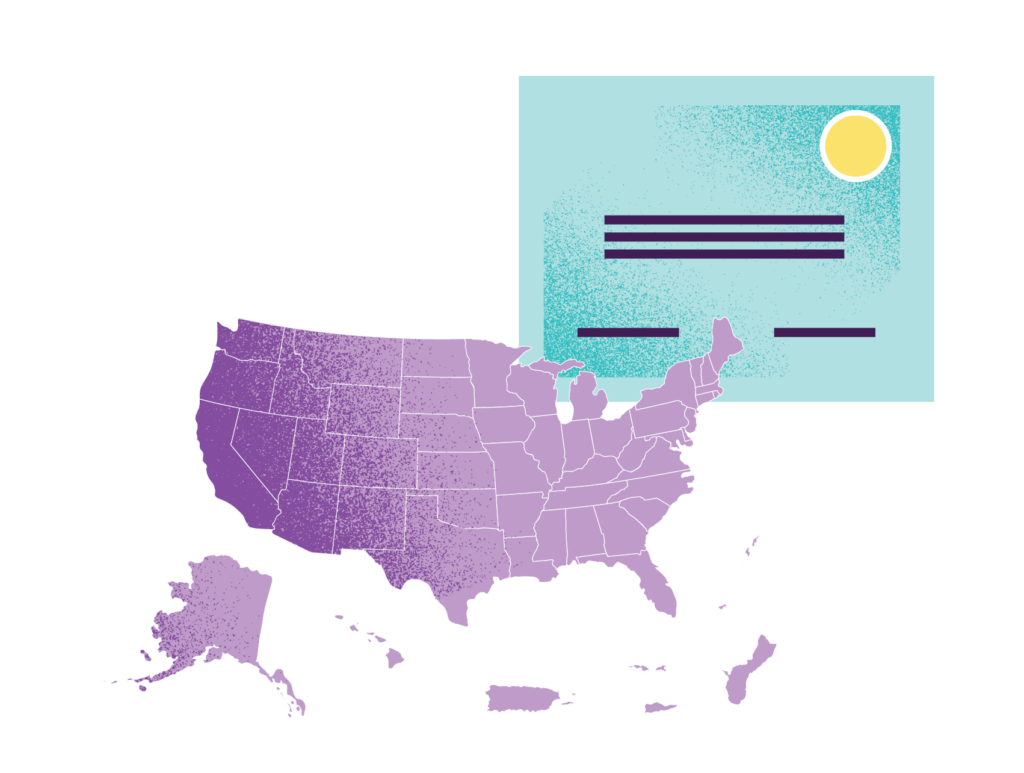What you need to know about the IMLC.
The Interstate Medical Licensure Compact (IMLC) is an agreement among 41 U.S. states, the District of Columbia, and the territory of Guam that simplifies and expedites the licensing process for physicians. This is an advantage for all physicians who need to practice across state lines but is especially valuable to those who currently work or have an interest in locum tenens.

It is important to know that the IMLC is not a license. You can think of it as a system that streamlines the process of obtaining multiple state licenses through a simplified application. You must meet certain requirements and enroll in the IMLC before applying for expedited licenses. Take some time to explore a few frequently asked questions below and see if you qualify to participate.
FAQs
Am I eligible to apply to the IMLC?
IMLC eligibility requirements:
- You must have a full and unrestricted medical license in a state that is a member of the IMLC and can serve as your State of Principal License (SPL). Your SPL must also be one of the following:
- The location of your primary residence.
- Where 25% of your practice occurs.
- 25% of practice is defined as “25% of total practice time in the preceding 6-months as determined by your SPL.” The IMLC requires verification from the facility of practice. Work done while on a locums assignment may not apply.
- Where you are employed to practice medicine by a person, business, or organization.
- The state of residence that you use to file your U.S. Federal Income Tax.
- You must be a graduate from an accredited medical school, or a school listed in the International Medical Education Directory.
- You must complete an ACGME or AOA accredited medical education program.
- You must pass each component of the USMLE or COMLEX-USA, or an equivalent predecessor exam accepted by the state medical board.
- All current and previous medical licenses must be free of disciplinary actions.
- You cannot have a record of criminal activity.
- You must not have any record of controlled substance violations related to your medical license.
- Active malpractice investigations must not be ongoing, although those with settled or dismissed cases may be considered.
- You must maintain your SPL status at all times, but you can change the location of your SPL after you receive a letter of qualification to participate in the IMLC through a process called redesignation.
Prior to submitting an IMLC application, applicants must verify that they meet the eligibility requirements and agree to adhere to the IMLC rules.
Which states are in the IMLC?
The IMLC map below shows what states and territories in the U.S. currently accept applications for expedited licensure. IMLC participating states currently include 41 states, the territory of Guam, and the District of Columbia. Jackson and Coker is active in all 50 states, and our associates have extensive knowledge of the IMLC process. Please remember that each state has different IMLC establishment requirements. We are happy to help you initiate the licensing process, even if your upcoming assignment is in a state that does not participate in the IMLC.
How do I apply to participate in the IMLC?
After confirming your eligibility, start your IMLC application on the official website. Remember that the IMLC is not a universal license for all states. Once accepted through your SPL, you must send your qualification letter to the states where you wish to practice. Each state may have extra fees, questions, and qualifications.
If you have previously held a license in a state, it may not be possible to request a license through the IMLC. However, there may be exceptions to this rule. Our licensing team is available to assist you in understanding your options.
Connect with us for IMLC application assistance.
What happens after I apply?
After you apply, your State of Principal License (SPL) will review your application and provide instructions regarding the fingerprinting process and background check. If you meet all requirements, you’ll receive a Letter of Qualification valid for 365 days from the issue date, allowing you to participate in the IMLC. You must then choose the states within the IMLC where you want to be licensed.
Once your chosen state receives your Letter of Qualification, they will issue your license.
The state where you wish to practice may request additional information to meet their requirements. You must comply with these requests or face potential action from the issuing medical board.
How much does the IMLC cost?
To join the IMLC, there is a non-refundable $700 application fee, plus a $100 handling fee. The $100 fee is charged once per application, not per state. So, you can apply for multiple licenses at once and only be charged once, but if you submit another application later for additional states the $100 fee will apply again.
State-specific fees may also apply, and license renewal costs are set by each IMLC member state’s medical board.
Learn more about fee structuring for participating IMLC states.
How long does the process take?
The time from start to finish will vary depending on which states you intend to work. One of the biggest factors is the background check turnaround time as each state has their own timelines. Your initial licensing timeline through the IMLC will likely be similar to the standard state licensing timeline, but once you are established in the IMLC, getting licensed in other member states can take as little as a few days or weeks.
How do I renew licenses I receive through the IMLC?
When it is time for you to renew your license, the state you are licensed in will send you a notification. Participants must complete IMLC renewals through the official website.
It is important to keep your licenses and Letter of Qualification (LOQ) current, especially if you are working in a locum tenens position or considering employment in another state or territory. Expired licenses may cause delays in your start date or disruption to your assignments.
Additionally, be aware that the expiration date of your LOQ is different from the expiration date of your state licenses. Renewing your LOQ before it expires could save you some time and help avoid delays, but the cost to reapply is still the same.
Committed to a better licensing experience.
Navigating the licensing process can be challenging, but with the support of the Interstate Medical Licensure Compact and our team of experienced professionals, you can be assured that you have the necessary assistance. Our team will collaborate directly with you to alleviate the administrative burden associated with the licensing process. Learn more about the IMLC and how we can assist you in getting started today.
For more information on the Interstate Medical Licensure Compact, visit the IMLCC’s website at https://imlcc.com/.


